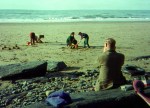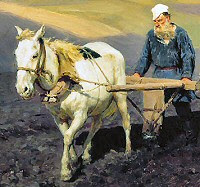We consider priorities expressed by three church personalities and ask, ‘What is the most important objective for the church? What will most please Papa? What is the Spirit urging? How does Jesus want us to respond?’
A polychotomy?
We are being tugged in many directions in our lives as believers, we have become a polychotomy. The word literally means ‘many cut apart’. The church looks like shattered glass; oneness turned into shards. There are voices telling us to believe the right things, say the right things, do the right things. Let’s take a look at some of them and ask ourselves the question, ‘What is the greatest priority?’
An article by Sam Hailes (no longer available) started me thinking about this. Sam interviewed Peter Farmer from Nottingham, Tony Goddard from Peterborough, and Beresford Job from Chigwell. These three men have different ideas on the main priority – mission and multiplication (Peter), making an impact and caring (Tony), following Biblical principles (Beresford). If we cast the net wider we will find many more groups with other insights and emphases. Every denomination and group has its own ideas about what is most important.
So who is right?
To answer this question we need to turn to the Bible. But where should we look?
Guidance from the Source
I suggest that the most important and fundamental guidance will come from carefully hearing what Jesus said. In particular, his prayer just before his arrest must be the best of all sources for what is essential.
Think about it for a moment. Yahshua knows that his whole life has brought him to this place of sacrifice. The burden upon him is enormous, his heart is heavy and he cries out to the Father. Surely what he asks at this moment will be the most important thing of all. So what does he say?
In John 17; Yahshua prays for his disciples, and there is much here that we need to take on board. But then he prays explicitly for you and me. And this is what he asks. Read it carefully – this is Jesus praying for you!
My prayer is not for [my disciples] alone. I pray also for those who will believe in me through their message, that all of them may be one, Father, just as you are in me and I am in you. May they also be in us so that the world may believe that you have sent me.
I have given them the glory that you gave me, that they may be one as we are one – I in them and you in me – so that they may be brought to complete unity. Then the world will know that you sent me and have loved them even as you have loved me.
Father, I want those you have given me to be with me where I am, and to see my glory, the glory you have given me because you loved me before the creation of the world. ‘Righteous Father, though the world does not know you, I know you, and they know that you have sent me. I have made you known to them, and will continue to make you known in order that the love you have for me may be in them and that I myself may be in them. (John 17:20-26)
He wants us to be one, united, not split apart. The Messiah himself prays to the Father that we may be one ‘just as you are in me and I am in you’. He wants us all to be ‘in us’ (the Father and the Son) so that the world may believe the Father has sent the Son.
More than that, Jesus has given us (you and me) the glory that the Father gave him. What?! Read that again. He’s given you and me his glory! Why? So that we may be one. Then the world will know.
And he prays that we may be where he is and see his glory.
There’s just no escaping this fundamental truth, that when the chips are down Jesus prays his heart out to his Father and asks that we may be one so that the world may believe.
What is the most striking thing about the church in our day? What does the world see when it looks at church? It sees multiple organisations, church is divided into myriad groups and denominations, often seeming to point to different things as being the most important. We are a broken, shattered people and the heart of Christ is broken when he sees us in this state. His heart is for us to be one just as he and the Father are one. And he wants to include us in their oneness and community.
Peter Farmer is not wrong about mutiplication and mission. Tony Goddard is not wrong about making an impact and caring for people. And Beresford Job is not wrong about following Biblical principles. But those are not the main things.
Becoming and remaining one
Above all, we now need to learn to be one. We need to accept we have differences, learn from one another. There is no single right belief, right speech, or right action. His children all shine with the light of his presence. If we are to be part of the answer to his prayer we need to learn from one another and grow together in love, building one another up, encouraging one another, helping one another to focus on every good thing. We need to grow up into Christ. Paul understood this well, see what he wrote to the Ephesian church.
As a prisoner for the Lord, then, I urge you to live a life worthy of the calling you have received. Be completely humble and gentle; be patient, bearing with one another in love. Make every effort to keep the unity of the Spirit through the bond of peace.
There is one body and one Spirit, just as you were called to one hope when you were called; one Lord, one faith, one baptism; one God and Father of all, who is over all and through all and in all.
Christ himself gave the apostles, the prophets, the evangelists, the pastors and teachers, to equip his people for works of service, so that the body of Christ may be built up until we all reach unity in the faith and in the knowledge of the Son of God and become mature, attaining to the whole measure of the fullness of Christ.
Then we will no longer be infants, tossed back and forth by the waves, and blown here and there by every wind of teaching and by the cunning and craftiness of people in their deceitful scheming. Instead, speaking the truth in love, we will grow to become in every respect the mature body of him who is the head, that is, Christ. From him the whole body, joined and held together by every supporting ligament, grows and builds itself up in love, as each part does its work. (Ephesians 4:1-6 and 11:16)
I am not suggesting that anyone is wrong, or that some are more right than others. I am simply observing that we remain shattered and that we are not yet perfectly formed into the one bride for whom Christ died and will return. Let us all strive to forge fresh bonds of peace. Paul called the Ephesians to keep the unity of the Spirit. Today we need to do more than that, we need to regain the unity of the Spirit.
Addendum
The above is a repost, only slightly changed, of an article I wrote way back in 2012. After 12 years, I think it’s worth repeating. If church has any purpose, any value, it springs from Jesus’ prayer for you and for me. Will I let him place the little fragment that I am into a shared oneness with my brothers and sisters? Will you? Last night I was privileged to be part of a Small Group meeting with friends in one of our homes – and this oneness, and sharing, and presence of the Spirit of Christ, and care for one another and the wider world was tangible amongst us. That is so refreshing, so encouraging, so good!





























